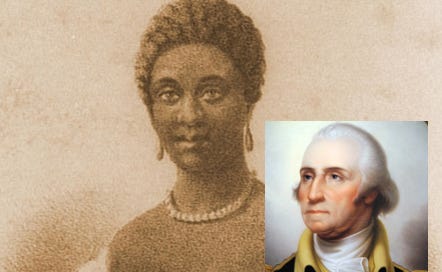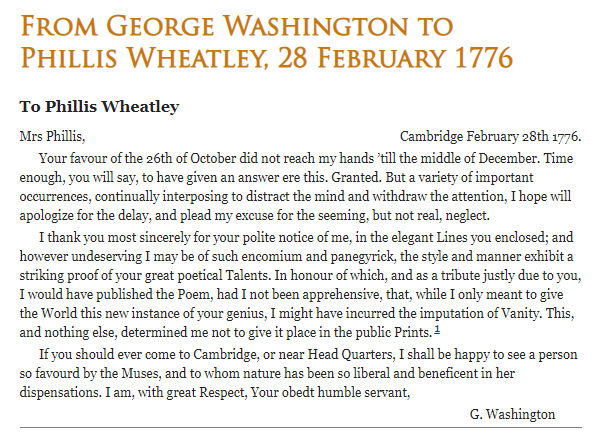Phillis Wheatley's 'His Excellency General Washington': A Patriotic Tribute from a Revolutionary Black Poetess
“Proceed, great chief, with virtue on thy side,
Thy ev’ry action let the Goddess guide.
A crown, a mansion, and a throne that shine,
With gold unfading, WASHINGTON! Be thine.” —Phillis Wheatley
We have heard a great deal in the last year about “celebrating black voices.” Now, there is no one who is more in favor of celebrating black American voices than I am. The only aspect I find frustrating is how, so often, the “black voices” being celebrated are only modern leftists, many of them (let's face it) producing very mediocre or even garbage art, like Jason Reynolds and Ibram X. Kendi. But America has a wealth of magnificent examples of black artists and black voices who are being ignored or even openly ridiculed by moderns (Reynolds’ and Kendi’s Stamped denigrated Booker T. Washington and Frederick Douglass, for instance). I think this is an unfair representation of black Americans. When did we last erect a statue to Booker T. Washington? When did Antifa last hold up Frederick Douglass as a shining example of a black hero and former slave overcoming terrible racist persecution? I had never heard of James Armistead Lafayette, the daring Revolutionary War double agent who “worked” for the British while feeding the Americans key information, until this week.
And what about the first black American to publish a book of poetry? Phillis Wheatley was captured from Africa and brought to America a slave, but she was later educated by her masters and published a book of poetry at about age 20 in 1773, while she was still a slave (making her the first US slave, first black, and third woman to publish work in America). She was freed not long afterwards. At a time when even many whites in America did not receive a high level of education, Wheatley was reportedly educated in English, Latin, Theology, History, Astronomy, and Greek, among other subjects. Phillis’s poetry was so impressive that many Americans doubted a black woman could have written it, so individuals such as famous John Hancock examined and then vouched for her. She went in a few years from a slave bought very cheap due to ill health to a famous poetess. Wheatley loved the Classics, both ancient and more modern. Her poetry references both these Classics and the Bible with ease. Phillis met with and was paid tribute by key Revolutionary figures George Washington and Benjamin Franklin. What a wonderful story of talent and perseverance overcoming racism!
Below is the transcript of a letter then-General Washington wrote in 1776 to Wheatley to thank her for a poem in his praise which she had sent him in 1775. Note that, from the letter, one would never know what Phillis’s race is; Washington (who was not at all a man given to exaggeration) writes a very striking tribute to Wheatley’s “great poetical Talents” and invites her who has been “so favour[e]d by the Muses” to meet him. Washington even signs himself “Your obed[ien]t humble servant.” Wheatley did in fact meet with Washington, and, though little is known about the 1776 meeting, it is said that the poetess received a “very courteous reception” and that several “important men” were forced to wait with their business while General Washington conversed with Phillis Wheatley.
Below is the poem Phillis Wheatley wrote for and sent to George Washington. I am no scholar, so I will not attempt an in-depth analysis of every line, but there are several points to notice. Firstly, Wheatley wrote this poem even before the Declaration of Independence was written and signed. This was very early in the war effort—and yet her confidence in the Revolution’s success (“Columbia” here means the American colonies) seems strong.
Secondly, Classical metaphors and imagery are at the heart of the poem, most particularly through using a “Goddess” as symbol of America’s heaven-sanctioned destiny. This segues into a third point, which is that Phillis sees the Revolution’s goal as divinely ordained—and Washington’s role as military leader of this Revolution seems divinely-appointed too. The Americans are the “land of freedom’s heaven-defended race,” and Americans’ leader Washington’s “virtues” and “valour” are at the center of the poem. He is the “great chief” who will move forward with Heaven’s blessing to achieve the cause of freedom. I do find it fascinating that Phillis predicts “A crown, a mansion, and a throne that shine” for Washington, though it is probably more symbolic than literal; for of course Washington refused to be crowned a king after the Revolution. But Phillis was certainly right, almost prophetic, to predict that Washington would gain immortality through his role as indispensable leader of the American Revolution.
“To His Excellency General Washington
Celestial choir! enthron’d in realms of light,
Columbia's scenes of glorious toils I write.
While freedom's cause her anxious breast alarms,
She flashes dreadful in refulgent arms.
See mother earth her offspring’s fate bemoan,
And nations gaze at scenes before unknown!
See the bright beams of heaven’s revolving light
Involved in sorrows and the veil of night!The Goddess comes, she moves divinely fair,
Olive and laurel binds Her golden hair:
Wherever shines this native of the skies,
Unnumber’d charms and recent graces rise.Muse! Bow propitious while my pen relates
How pour her armies through a thousand gates,
As when Eolus heaven’s fair face deforms,
Enwrapp’d in tempest and a night of storms;
Astonish’d ocean feels the wild uproar,
The refluent surges beat the sounding shore;
Or think as leaves in Autumn’s golden reign,
Such, and so many, moves the warrior’s train.
In bright array they seek the work of war,
Where high unfurl’d the ensign waves in air.
Shall I to Washington their praise recite?
Enough thou know’st them in the fields of fight.
Thee, first in peace and honors—we demand
The grace and glory of thy martial band.
Fam’d for thy valour, for thy virtues more,
Hear every tongue thy guardian aid implore!One century scarce perform’d its destined round,
When Gallic powers Columbia’s fury found;
And so may you, whoever dares disgrace
The land of freedom’s heaven-defended race!
Fix’d are the eyes of nations on the scales,
For in their hopes Columbia’s arm prevails.
Anon Britannia droops the pensive head,
While round increase the rising hills of dead.
Ah! Cruel blindness to Columbia’s state!
Lament thy thirst of boundless power too late.Proceed, great chief, with virtue on thy side,
Thy ev’ry action let the Goddess guide.
A crown, a mansion, and a throne that shine,
With gold unfading, WASHINGTON! Be thine.”





